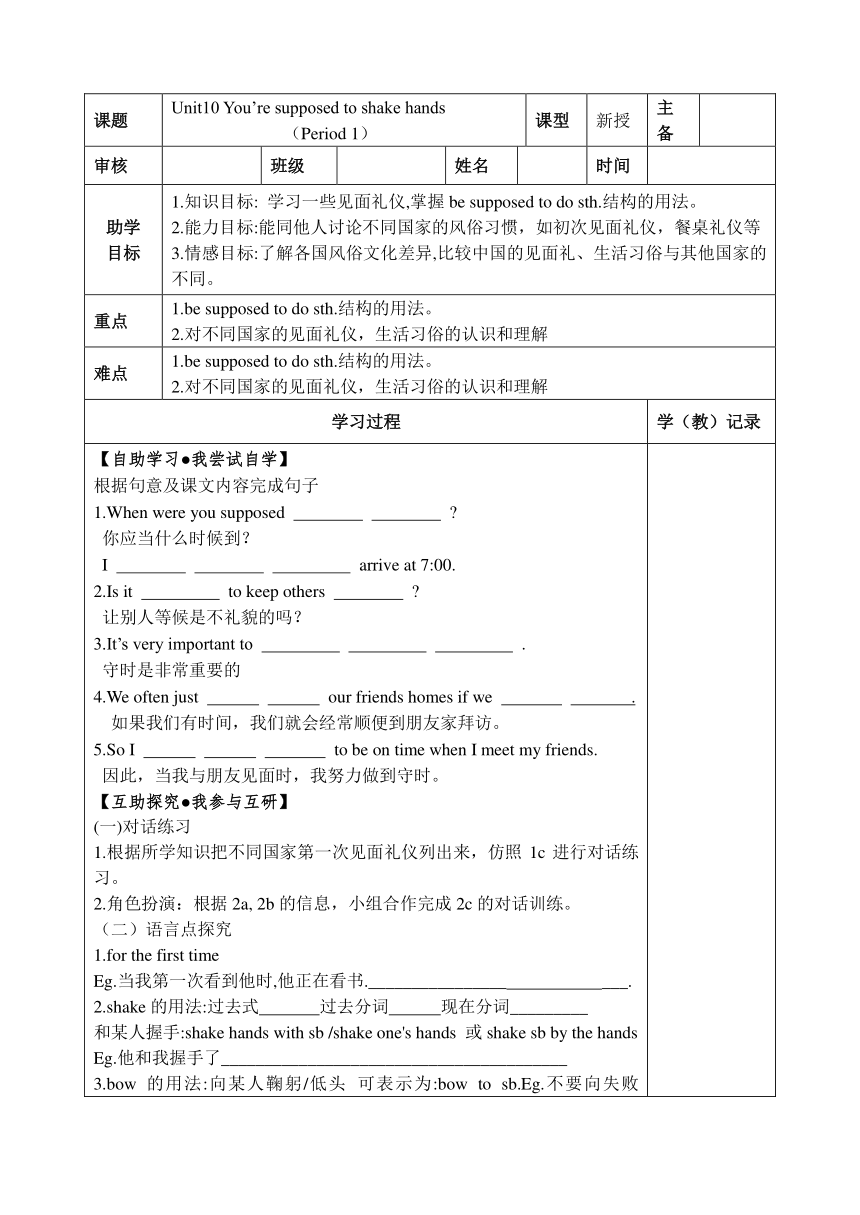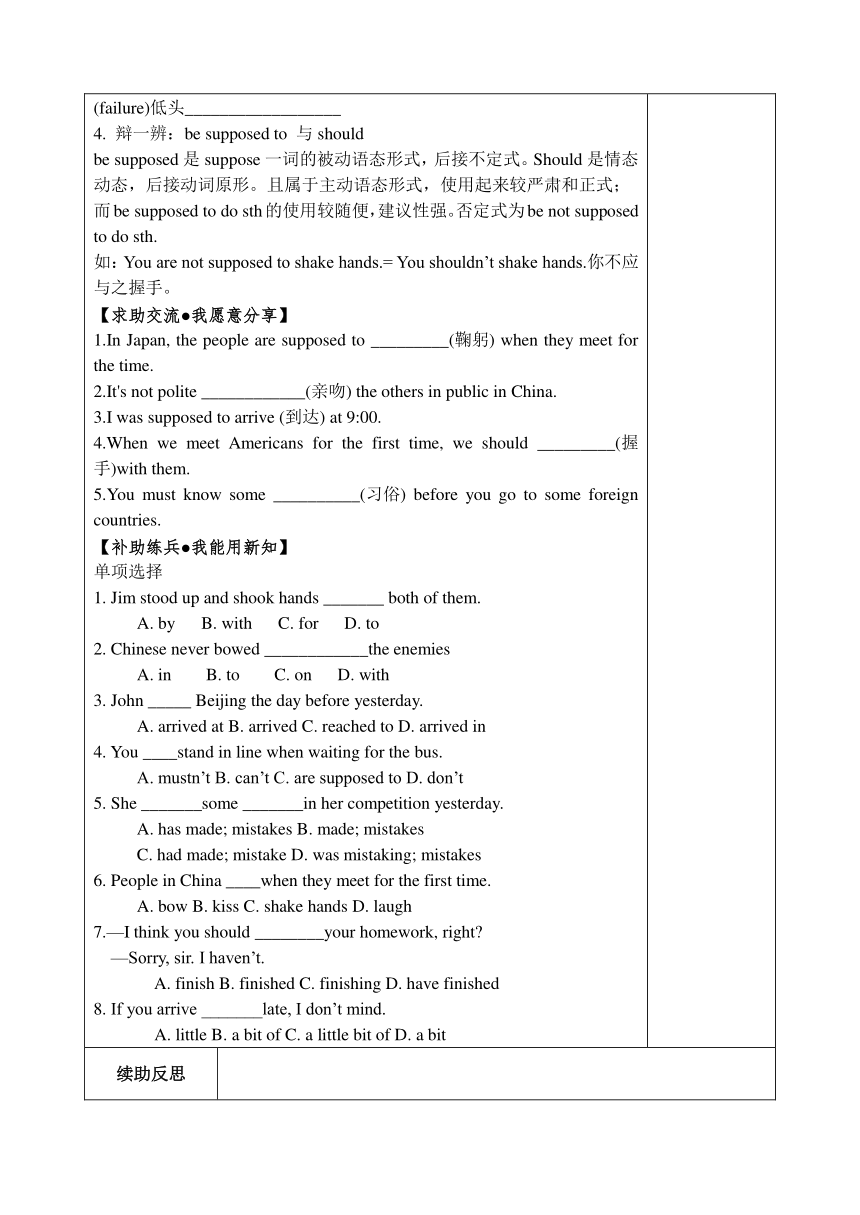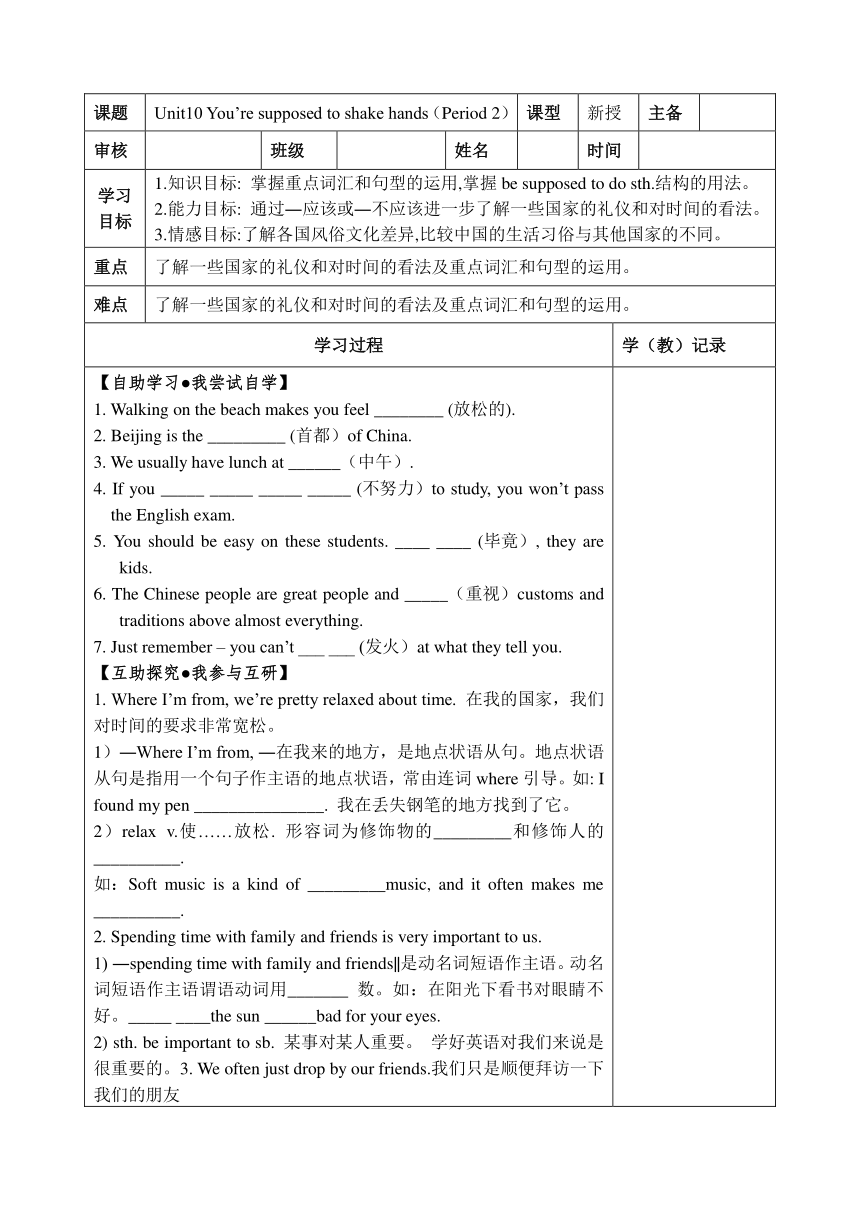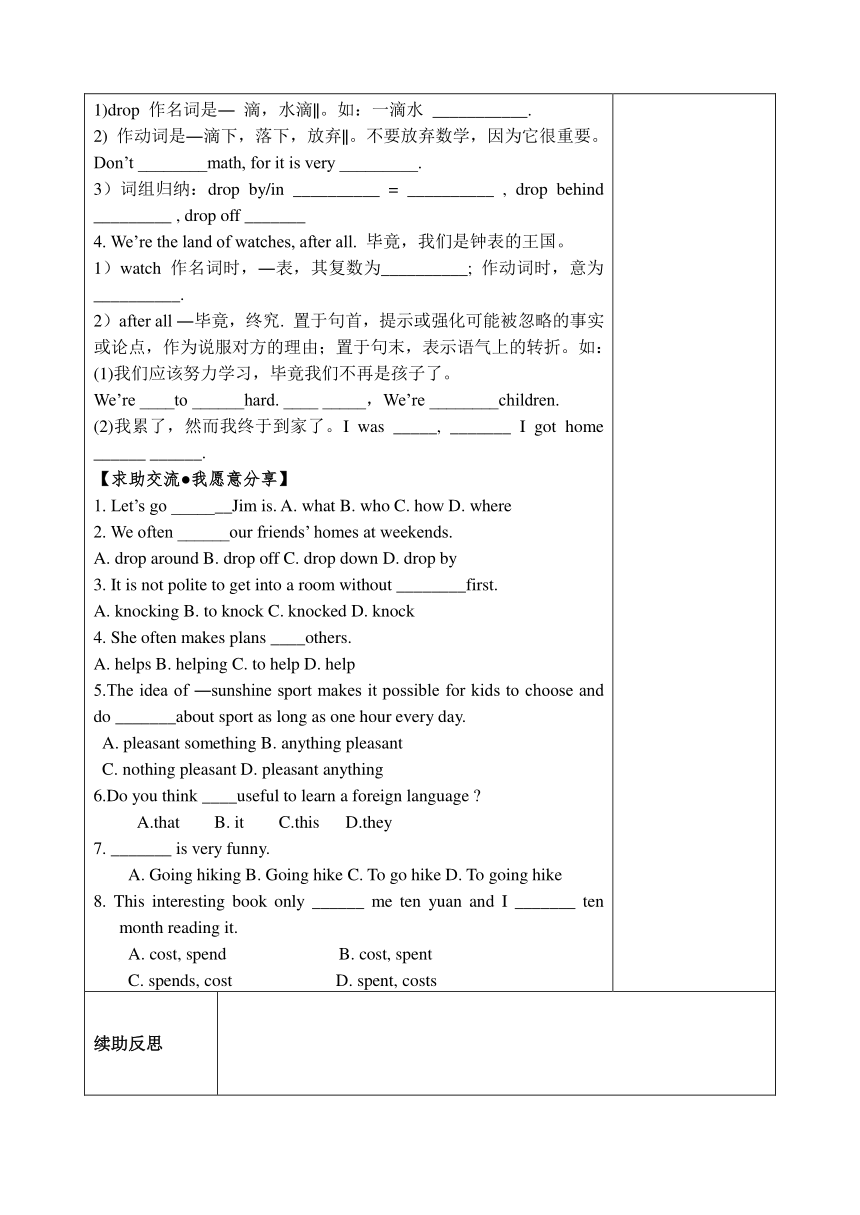人教新目标九年级英语助学案 Unit10 You,re supposed to shake hands4课时
文档属性
| 名称 | 人教新目标九年级英语助学案 Unit10 You,re supposed to shake hands4课时 |  | |
| 格式 | zip | ||
| 文件大小 | 78.5KB | ||
| 资源类型 | 教案 | ||
| 版本资源 | 人教新目标(Go for it)版 | ||
| 科目 | 英语 | ||
| 更新时间 | 2019-01-18 10:10:38 | ||
图片预览




文档简介
课题 Unit10 You’re supposed to shake hands(Period 1) 课型 新授 主备
审核 班级 姓名 时间
助学 目标 1.知识目标: 学习一些见面礼仪,掌握be supposed to do sth.结构的用法。 2.能力目标:能同他人讨论不同国家的风俗习惯,如初次见面礼仪,餐桌礼仪等 3.情感目标:了解各国风俗文化差异,比较中国的见面礼、生活习俗与其他国家的不同。
重点 1.be supposed to do sth.结构的用法。 2.对不同国家的见面礼仪,生活习俗的认识和理解
难点 1.be supposed to do sth.结构的用法。 2.对不同国家的见面礼仪,生活习俗的认识和理解
学习过程 学(教)记录
【自助学习●我尝试自学】根据句意及课文内容完成句子1.When were you supposed ? 你应当什么时候到? I arrive at 7:00. 2.Is it to keep others ? 让别人等候是不礼貌的吗? 3.It’s very important to . 守时是非常重要的 4.We often just our friends homes if we .如果我们有时间,我们就会经常顺便到朋友家拜访。 5.So I to be on time when I meet my friends. 因此,当我与朋友见面时,我努力做到守时。【互助探究●我参与互研】(一)对话练习 1.根据所学知识把不同国家第一次见面礼仪列出来,仿照1c进行对话练习。 2.角色扮演:根据2a, 2b的信息,小组合作完成2c的对话训练。 (二)语言点探究 1.for the first time Eg.当我第一次看到他时,他正在看书.________________ ___. 2.shake的用法:过去式 过去分词 现在分词_________ 和某人握手:shake hands with sb /shake one's hands 或shake sb by the hands Eg.他和我握手了________________________________________ 3.bow的用法:向某人鞠躬/低头 可表示为:bow to sb.Eg.不要向失败(failure)低头__________________ 4. 辩一辨:be supposed to 与should be supposed是suppose一词的被动语态形式,后接不定式。Should是情态动态,后接动词原形。且属于主动语态形式,使用起来较严肃和正式; 而be supposed to do sth的使用较随便,建议性强。否定式为be not supposed to do sth. 如:You are not supposed to shake hands.= You shouldn’t shake hands.你不应与之握手。【求助交流●我愿意分享】1.In Japan, the people are supposed to _________(鞠躬) when they meet for the time. 2.It's not polite ____________(亲吻) the others in public in China. 3.I was supposed to arrive (到达) at 9:00. 4.When we meet Americans for the first time, we should _________(握手)with them. 5.You must know some __________(习俗) before you go to some foreign countries.【补助练兵●我能用新知】单项选择 1. Jim stood up and shook hands _______ both of them. A. by B. with C. for D. to 2. Chinese never bowed ____________the enemies A. in B. to C. on D. with 3. John _____ Beijing the day before yesterday. A. arrived at B. arrived C. reached to D. arrived in 4. You ____stand in line when waiting for the bus. A. mustn’t B. can’t C. are supposed to D. don’t 5. She _______some _______in her competition yesterday. A. has made; mistakes B. made; mistakes C. had made; mistake D. was mistaking; mistakes 6. People in China ____when they meet for the first time. A. bow B. kiss C. shake hands D. laugh 7.—I think you should ________your homework, right? —Sorry, sir. I haven’t. A. finish B. finished C. finishing D. have finished 8. If you arrive _______late, I don’t mind. A. little B. a bit of C. a little bit of D. a bit
续助反思
课题 Unit10 You’re supposed to shake hands(Period 2) 课型 新授 主备
审核 班级 姓名 时间
学习 目标 1.知识目标: 掌握重点词汇和句型的运用,掌握be supposed to do sth.结构的用法。 2.能力目标: 通过―应该或―不应该进一步了解一些国家的礼仪和对时间的看法。 3.情感目标:了解各国风俗文化差异,比较中国的生活习俗与其他国家的不同。
重点 了解一些国家的礼仪和对时间的看法及重点词汇和句型的运用。
难点 了解一些国家的礼仪和对时间的看法及重点词汇和句型的运用。
学习过程 学(教)记录
【自助学习●我尝试自学】1. Walking on the beach makes you feel ________ (放松的). 2. Beijing is the _________ (首都)of China. 3. We usually have lunch at ______(中午). 4. If you _____ _____ _____ _____ (不努力)to study, you won’t pass the English exam. 5. You should be easy on these students. ____ ____ (毕竟), they are kids. 6. The Chinese people are great people and _____(重视)customs and traditions above almost everything. 7. Just remember – you can’t ___ ___ (发火)at what they tell you.【互助探究●我参与互研】1. Where I’m from, we’re pretty relaxed about time. 在我的国家,我们对时间的要求非常宽松。 1)―Where I’m from, ―在我来的地方,是地点状语从句。地点状语从句是指用一个句子作主语的地点状语,常由连词where引导。如: I found my pen _______________. 我在丢失钢笔的地方找到了它。 2)relax v.使……放松. 形容词为修饰物的_________和修饰人的__________. 如:Soft music is a kind of _________music, and it often makes me __________. 2. Spending time with family and friends is very important to us. 1) ―spending time with family and friends‖是动名词短语作主语。动名词短语作主语谓语动词用_______ 数。如:在阳光下看书对眼睛不好。_____ ____the sun ______bad for your eyes. 2) sth. be important to sb. 某事对某人重要。 学好英语对我们来说是很重要的。3. We often just drop by our friends.我们只是顺便拜访一下我们的朋友 1)drop 作名词是― 滴,水滴‖。如:一滴水 ___________. 2) 作动词是―滴下,落下,放弃‖。不要放弃数学,因为它很重要。Don’t ________math, for it is very _________. 3)词组归纳:drop by/in __________ = __________ , drop behind _________ , drop off _______ 4. We’re the land of watches, after all. 毕竟,我们是钟表的王国。 1)watch作名词时,―表,其复数为__________; 作动词时,意为__________. 2)after all ―毕竟,终究. 置于句首,提示或强化可能被忽略的事实或论点,作为说服对方的理由;置于句末,表示语气上的转折。如: (1)我们应该努力学习,毕竟我们不再是孩子了。 We’re ____to ______hard. ____ _____,We’re ________children. (2)我累了,然而我终于到家了。I was _____, _______ I got home ______ ______.【求助交流●我愿意分享】1. Let’s go _______Jim is. A. what B. who C. how D. where 2. We often ______our friends’ homes at weekends. A. drop around B. drop off C. drop down D. drop by 3. It is not polite to get into a room without ________first. A. knocking B. to knock C. knocked D. knock 4. She often makes plans ____others. A. helps B. helping C. to help D. help 5.The idea of ―sunshine sport makes it possible for kids to choose and do _______about sport as long as one hour every day. A. pleasant something B. anything pleasant C. nothing pleasant D. pleasant anything 6.Do you think ____useful to learn a foreign language ? A.that B. it C.this D.they 7. _______ is very funny. A. Going hiking B. Going hike C. To go hike D. To going hike 8. This interesting book only ______ me ten yuan and I _______ ten month reading it. A. cost, spend B. cost, spent C. spends, cost D. spent, costs
续助反思
课题 Unit10 You’re supposed to shake hands(Period 3) 课型 新授 主备
审核 班级 姓名 时间
学习 目标 1.知识目标: 掌握重点词汇和句型的运用,掌握be supposed to do sth.结构的用法。 2.能力目标: 能听懂Section B, 2a,2b的内容,完成相应的练习。 3.情感目标: 对一些国家的风俗习惯和饮食文化、餐桌礼仪的了解,进一步提高对文明生活的认识。
重点 了解一些国家的风俗习惯和饮食文化、餐桌礼仪,听力技能的提高。
难点 了解一些国家的风俗习惯和饮食文化、餐桌礼仪,听力技能的提高。
学习过程 学(教)记录
【自助学习●我尝试自学】1. 根据汉语意思完成句子1) 你第一次遇到某一个人应该做什么? ________ ______ you ______ ______ ______ when you meet someone for the first time? 2) 你应该握手。 You _______ _______ ________ ________ _________. 3)你不应该亲吻。 You ________ ________ _______ kiss. 4) --你应该什么时候到? --我应当7点钟到。 --When were you ________ _______ _________? --I _______ ________ ______ _______ at 7:00. 5) --我应该穿牛仔裤吗? --不应该穿,希望你穿西服打领带。 --__________ I ________ _________ wear jeans? --No, you _______ ________ _______ wear a suit and tie. 6) --让别人一直等不礼貌吗? --对,让别人一直等不礼貌。 --_________ ________ ________ to keep others waiting? --Yes, it’s _______ _________ _______ others waiting. 7) --准时很重要吗? --是的,准时是很重要。 --Is _______ ________ ______ _______ on time? -- Yes, it’s important to be on time. 2. 学生们完成填空试题后,可以打开课本检查答案,对错误的句子,单独进行强化记忆。【互助探究●我参与互研】(一)听力练习 1. 2a 先看懂四幅图片的内容,然认真听录音内容,把2a的插图顺序标上。 2. 2b 先猜猜左边与右边如何搭配,再听录音核实自己的猜测是否正确。 3.小组合作完成2c的对话练习。(二)语言点探究 1. In China, you’re not supposed to pick up your bowl to eat. 在中国,你不应该端着碗吃饭。 pick 是动词,意为拾取,挑选,采摘‖。短语 pick up 有―捡起,拾起,(车辆)搭载(某人)或接送(某人)‖等意思。如: 1)The girls ______ _______ apples on the farm. 姑娘们正在农场摘苹果。 2)My car will ______ you ______ this afternoon. 我的车下午来接你。 3)He ______ up a wallet _______ the way to school. 他在上学的路上捡到了一个钱包。 2. You shouldn’t point at anyone with your chopsticks. 你不应该用筷子指着任何人。辩一辩:point at, point to与point out: 1)point意思为―指着,指向,在用事物名词作主语时,一般和point to连用,在用人物名词作主语时,常用point at.如,Our teacher pointed at the map on the wal.我们的老师在指着墙上的地图。The clock needle points to six.时钟的针指向六。2)point at可以分开来理解,也就是point后直接跟名词或代词作宾语,at表示方向,point to没有这种用法。3)point out是―指出―的意思,属于―动副‖结构的短语,虽可跟宾语,但若是代词,须放point和out之间。如,Can you point out the church in this picture?你能指出这张图画中的教堂吗【求助交流●我愿意分享】一、单项填空 1. The books are on the floor, please ________. A. pick up them B. look for them C. pick them up D. look them for 2. Our teacher points ____the blackboard and explains(解释) difficult sentences. A. at B. to C. out D. on 3. Mother said angrily, ―I ask you to sit _______table, not to sit _____ the table.A. at; on B. in; in C. at; at D. on; to 4. We go to school ________foot and eat meals __________ chopsticks. A. by; by B. with; by C. on; with D. on; use 5. You aren’t supposed to eat or drink while ________down the street. A. to walk B. walking C. walks D. walked 6. The boy found _______ easy to fly kites. A. that B. it C. this D. it’s
续助反思
课题 Unit10 You’re supposed to shake hands(Period 4) 课型 新授 主备
审核 班级 姓名 时间
学习 目标 1. 掌握文中出现的重点词汇和句型结构。 2. 学会表达各国饮食起居、生活习俗和对时间的看法。 3.了解各国风俗文化差异,比较中国的见面礼、生活习俗与其他国家的不同。
重点 学会表达各国饮食起居、生活习俗和对时间的看法及文中出现的重点词汇和句型结构的运用。
难点 学会表达各国饮食起居、生活习俗和对时间的看法及文中出现的重点词汇和句型结构的运用。
学习过程 学(教)记录
【自助学习●我尝试自学】1.You are supposed to eat with your hands.(对画线部分提问) ________are you supposed__________ _________? 2. They arrived at school late because the traffic was heavy.(改为同义句) They were______ _________school________ _______the heavy traffic. 3. Having a healthy lifestyle is very important.(改为同义句) ____very important_______ _________a healthy lifestyle. 4.We expected them to win the race.(用they改为被动句) They______ ________ _________win the race.【互助探究●我参与互研】1. It’s even better than I thought it would be. 它甚至比我想象的好得多。 1)even是程度副词,意为―甚至,更‖,用来修饰比较级。归纳总结:还可修饰比较级的副词有 。 2)better是_______的比较级,最高级为___________. 2. I was a bit nervous before I arrived here…在我到这儿之前有点紧张。辩一辨:a bit, a little和 a few 1) a bit―有点儿,稍许‖之意,可用作程度状语修饰形容词或副词,也可修饰不可数名词,形式为a bit of+ 不可数名词。 2) a little ―一点,少量‖,用作程度状语修饰形容词或副词,与a bit 相同,也可直接修饰不可数名词,即 a little + 不可数名词。 3) a few ―一些,几个‖,用于修饰可数名词的复数,即a few+ 复数名词。little, few表示否定,表示―几乎没有‖之意。练一练:(1) There is ________water in the glass. (2) I have ________apples. (3) I think the coat is _______expensive. 3. You’re not supposed to eat anything with your hands except bread.除了面包,你可以用手吃任何东西。 except 作介词时,意为―除……之外‖,表示把某一部分从整体中排除在外,相当于词等。besides 作介词时,意为―除……以外还有‖,常表示包括被除去的对象在内。练一练:1)除了星期六和星期天,我们每天都去上学。 We go to school ________ Saturday and Sunday. 2)除了汤姆成功外,我们也都成功了。We all succeed _________Tom. 4. I find it difficult to remember everything. 我发现很难记住所有的事情。该句结构为―主语+find it +adj. +to do sth‖, 意为 ―发现做某事怎么样‖。其中it 是_____语,adj. 是宾语补足语,to do sth是真正的______语。此结构可转换为 ―主语+find that it be +adj. + to do sth‖. 如:We find it easy to learn swimming. 同义句:三、反馈检测 (按要求写出单词) 1. think(过去式副词形容词) 4.familiar(反义词 5.Korea (形容词6. knife(复数7. crowd(形容词8. manner(同义词)【求助交流●我愿意分享】( ) 1. ------ Will you come to the dinner party? ------ I won’t come until Jenny __________. A. will be invited B. can be invited C. invited D. is invited ( ) 2. John _______ Beijing the day before yesterday. A. arrived at B. arrived C. reached to D. arrived in ( ) 3.In Switzerland, people ________ visit a friend’s house. A. make plans B. make plans to C. makes plans to D. make a plan ( ) 4.It’s too hot. Do you mind ______ the window? A. my closing B. my opening C. open D. close ( ) 5.She ______Shanghai next week. A, is leaving for B. leaves for C. leaved D. left ( ) 6.What are you nervous _____, Mary? A. in B. at C. on D. about ( ) 7.We go to school every day _____ Saturday and Sunday. A. beside B. besides C. except D. except for ( ) 8.Yang Liwei is proud ____ his motherland. A. in B. of C. from D. for ( ) 9.You’re supposed to instead of in Korea. A.bow,shake hands B. bow,shaking hands C. bowing,shake hands D. bowing,shaking hands ( ) 10.He _____ in his English Test Paper. His teacher was very angry with him. A. makes some mistakes B. make a mistakeC.made few mistakes D. made many mistakes
续助反思
PAGE
审核 班级 姓名 时间
助学 目标 1.知识目标: 学习一些见面礼仪,掌握be supposed to do sth.结构的用法。 2.能力目标:能同他人讨论不同国家的风俗习惯,如初次见面礼仪,餐桌礼仪等 3.情感目标:了解各国风俗文化差异,比较中国的见面礼、生活习俗与其他国家的不同。
重点 1.be supposed to do sth.结构的用法。 2.对不同国家的见面礼仪,生活习俗的认识和理解
难点 1.be supposed to do sth.结构的用法。 2.对不同国家的见面礼仪,生活习俗的认识和理解
学习过程 学(教)记录
【自助学习●我尝试自学】根据句意及课文内容完成句子1.When were you supposed ? 你应当什么时候到? I arrive at 7:00. 2.Is it to keep others ? 让别人等候是不礼貌的吗? 3.It’s very important to . 守时是非常重要的 4.We often just our friends homes if we .如果我们有时间,我们就会经常顺便到朋友家拜访。 5.So I to be on time when I meet my friends. 因此,当我与朋友见面时,我努力做到守时。【互助探究●我参与互研】(一)对话练习 1.根据所学知识把不同国家第一次见面礼仪列出来,仿照1c进行对话练习。 2.角色扮演:根据2a, 2b的信息,小组合作完成2c的对话训练。 (二)语言点探究 1.for the first time Eg.当我第一次看到他时,他正在看书.________________ ___. 2.shake的用法:过去式 过去分词 现在分词_________ 和某人握手:shake hands with sb /shake one's hands 或shake sb by the hands Eg.他和我握手了________________________________________ 3.bow的用法:向某人鞠躬/低头 可表示为:bow to sb.Eg.不要向失败(failure)低头__________________ 4. 辩一辨:be supposed to 与should be supposed是suppose一词的被动语态形式,后接不定式。Should是情态动态,后接动词原形。且属于主动语态形式,使用起来较严肃和正式; 而be supposed to do sth的使用较随便,建议性强。否定式为be not supposed to do sth. 如:You are not supposed to shake hands.= You shouldn’t shake hands.你不应与之握手。【求助交流●我愿意分享】1.In Japan, the people are supposed to _________(鞠躬) when they meet for the time. 2.It's not polite ____________(亲吻) the others in public in China. 3.I was supposed to arrive (到达) at 9:00. 4.When we meet Americans for the first time, we should _________(握手)with them. 5.You must know some __________(习俗) before you go to some foreign countries.【补助练兵●我能用新知】单项选择 1. Jim stood up and shook hands _______ both of them. A. by B. with C. for D. to 2. Chinese never bowed ____________the enemies A. in B. to C. on D. with 3. John _____ Beijing the day before yesterday. A. arrived at B. arrived C. reached to D. arrived in 4. You ____stand in line when waiting for the bus. A. mustn’t B. can’t C. are supposed to D. don’t 5. She _______some _______in her competition yesterday. A. has made; mistakes B. made; mistakes C. had made; mistake D. was mistaking; mistakes 6. People in China ____when they meet for the first time. A. bow B. kiss C. shake hands D. laugh 7.—I think you should ________your homework, right? —Sorry, sir. I haven’t. A. finish B. finished C. finishing D. have finished 8. If you arrive _______late, I don’t mind. A. little B. a bit of C. a little bit of D. a bit
续助反思
课题 Unit10 You’re supposed to shake hands(Period 2) 课型 新授 主备
审核 班级 姓名 时间
学习 目标 1.知识目标: 掌握重点词汇和句型的运用,掌握be supposed to do sth.结构的用法。 2.能力目标: 通过―应该或―不应该进一步了解一些国家的礼仪和对时间的看法。 3.情感目标:了解各国风俗文化差异,比较中国的生活习俗与其他国家的不同。
重点 了解一些国家的礼仪和对时间的看法及重点词汇和句型的运用。
难点 了解一些国家的礼仪和对时间的看法及重点词汇和句型的运用。
学习过程 学(教)记录
【自助学习●我尝试自学】1. Walking on the beach makes you feel ________ (放松的). 2. Beijing is the _________ (首都)of China. 3. We usually have lunch at ______(中午). 4. If you _____ _____ _____ _____ (不努力)to study, you won’t pass the English exam. 5. You should be easy on these students. ____ ____ (毕竟), they are kids. 6. The Chinese people are great people and _____(重视)customs and traditions above almost everything. 7. Just remember – you can’t ___ ___ (发火)at what they tell you.【互助探究●我参与互研】1. Where I’m from, we’re pretty relaxed about time. 在我的国家,我们对时间的要求非常宽松。 1)―Where I’m from, ―在我来的地方,是地点状语从句。地点状语从句是指用一个句子作主语的地点状语,常由连词where引导。如: I found my pen _______________. 我在丢失钢笔的地方找到了它。 2)relax v.使……放松. 形容词为修饰物的_________和修饰人的__________. 如:Soft music is a kind of _________music, and it often makes me __________. 2. Spending time with family and friends is very important to us. 1) ―spending time with family and friends‖是动名词短语作主语。动名词短语作主语谓语动词用_______ 数。如:在阳光下看书对眼睛不好。_____ ____the sun ______bad for your eyes. 2) sth. be important to sb. 某事对某人重要。 学好英语对我们来说是很重要的。3. We often just drop by our friends.我们只是顺便拜访一下我们的朋友 1)drop 作名词是― 滴,水滴‖。如:一滴水 ___________. 2) 作动词是―滴下,落下,放弃‖。不要放弃数学,因为它很重要。Don’t ________math, for it is very _________. 3)词组归纳:drop by/in __________ = __________ , drop behind _________ , drop off _______ 4. We’re the land of watches, after all. 毕竟,我们是钟表的王国。 1)watch作名词时,―表,其复数为__________; 作动词时,意为__________. 2)after all ―毕竟,终究. 置于句首,提示或强化可能被忽略的事实或论点,作为说服对方的理由;置于句末,表示语气上的转折。如: (1)我们应该努力学习,毕竟我们不再是孩子了。 We’re ____to ______hard. ____ _____,We’re ________children. (2)我累了,然而我终于到家了。I was _____, _______ I got home ______ ______.【求助交流●我愿意分享】1. Let’s go _______Jim is. A. what B. who C. how D. where 2. We often ______our friends’ homes at weekends. A. drop around B. drop off C. drop down D. drop by 3. It is not polite to get into a room without ________first. A. knocking B. to knock C. knocked D. knock 4. She often makes plans ____others. A. helps B. helping C. to help D. help 5.The idea of ―sunshine sport makes it possible for kids to choose and do _______about sport as long as one hour every day. A. pleasant something B. anything pleasant C. nothing pleasant D. pleasant anything 6.Do you think ____useful to learn a foreign language ? A.that B. it C.this D.they 7. _______ is very funny. A. Going hiking B. Going hike C. To go hike D. To going hike 8. This interesting book only ______ me ten yuan and I _______ ten month reading it. A. cost, spend B. cost, spent C. spends, cost D. spent, costs
续助反思
课题 Unit10 You’re supposed to shake hands(Period 3) 课型 新授 主备
审核 班级 姓名 时间
学习 目标 1.知识目标: 掌握重点词汇和句型的运用,掌握be supposed to do sth.结构的用法。 2.能力目标: 能听懂Section B, 2a,2b的内容,完成相应的练习。 3.情感目标: 对一些国家的风俗习惯和饮食文化、餐桌礼仪的了解,进一步提高对文明生活的认识。
重点 了解一些国家的风俗习惯和饮食文化、餐桌礼仪,听力技能的提高。
难点 了解一些国家的风俗习惯和饮食文化、餐桌礼仪,听力技能的提高。
学习过程 学(教)记录
【自助学习●我尝试自学】1. 根据汉语意思完成句子1) 你第一次遇到某一个人应该做什么? ________ ______ you ______ ______ ______ when you meet someone for the first time? 2) 你应该握手。 You _______ _______ ________ ________ _________. 3)你不应该亲吻。 You ________ ________ _______ kiss. 4) --你应该什么时候到? --我应当7点钟到。 --When were you ________ _______ _________? --I _______ ________ ______ _______ at 7:00. 5) --我应该穿牛仔裤吗? --不应该穿,希望你穿西服打领带。 --__________ I ________ _________ wear jeans? --No, you _______ ________ _______ wear a suit and tie. 6) --让别人一直等不礼貌吗? --对,让别人一直等不礼貌。 --_________ ________ ________ to keep others waiting? --Yes, it’s _______ _________ _______ others waiting. 7) --准时很重要吗? --是的,准时是很重要。 --Is _______ ________ ______ _______ on time? -- Yes, it’s important to be on time. 2. 学生们完成填空试题后,可以打开课本检查答案,对错误的句子,单独进行强化记忆。【互助探究●我参与互研】(一)听力练习 1. 2a 先看懂四幅图片的内容,然认真听录音内容,把2a的插图顺序标上。 2. 2b 先猜猜左边与右边如何搭配,再听录音核实自己的猜测是否正确。 3.小组合作完成2c的对话练习。(二)语言点探究 1. In China, you’re not supposed to pick up your bowl to eat. 在中国,你不应该端着碗吃饭。 pick 是动词,意为拾取,挑选,采摘‖。短语 pick up 有―捡起,拾起,(车辆)搭载(某人)或接送(某人)‖等意思。如: 1)The girls ______ _______ apples on the farm. 姑娘们正在农场摘苹果。 2)My car will ______ you ______ this afternoon. 我的车下午来接你。 3)He ______ up a wallet _______ the way to school. 他在上学的路上捡到了一个钱包。 2. You shouldn’t point at anyone with your chopsticks. 你不应该用筷子指着任何人。辩一辩:point at, point to与point out: 1)point意思为―指着,指向,在用事物名词作主语时,一般和point to连用,在用人物名词作主语时,常用point at.如,Our teacher pointed at the map on the wal.我们的老师在指着墙上的地图。The clock needle points to six.时钟的针指向六。2)point at可以分开来理解,也就是point后直接跟名词或代词作宾语,at表示方向,point to没有这种用法。3)point out是―指出―的意思,属于―动副‖结构的短语,虽可跟宾语,但若是代词,须放point和out之间。如,Can you point out the church in this picture?你能指出这张图画中的教堂吗【求助交流●我愿意分享】一、单项填空 1. The books are on the floor, please ________. A. pick up them B. look for them C. pick them up D. look them for 2. Our teacher points ____the blackboard and explains(解释) difficult sentences. A. at B. to C. out D. on 3. Mother said angrily, ―I ask you to sit _______table, not to sit _____ the table.A. at; on B. in; in C. at; at D. on; to 4. We go to school ________foot and eat meals __________ chopsticks. A. by; by B. with; by C. on; with D. on; use 5. You aren’t supposed to eat or drink while ________down the street. A. to walk B. walking C. walks D. walked 6. The boy found _______ easy to fly kites. A. that B. it C. this D. it’s
续助反思
课题 Unit10 You’re supposed to shake hands(Period 4) 课型 新授 主备
审核 班级 姓名 时间
学习 目标 1. 掌握文中出现的重点词汇和句型结构。 2. 学会表达各国饮食起居、生活习俗和对时间的看法。 3.了解各国风俗文化差异,比较中国的见面礼、生活习俗与其他国家的不同。
重点 学会表达各国饮食起居、生活习俗和对时间的看法及文中出现的重点词汇和句型结构的运用。
难点 学会表达各国饮食起居、生活习俗和对时间的看法及文中出现的重点词汇和句型结构的运用。
学习过程 学(教)记录
【自助学习●我尝试自学】1.You are supposed to eat with your hands.(对画线部分提问) ________are you supposed__________ _________? 2. They arrived at school late because the traffic was heavy.(改为同义句) They were______ _________school________ _______the heavy traffic. 3. Having a healthy lifestyle is very important.(改为同义句) ____very important_______ _________a healthy lifestyle. 4.We expected them to win the race.(用they改为被动句) They______ ________ _________win the race.【互助探究●我参与互研】1. It’s even better than I thought it would be. 它甚至比我想象的好得多。 1)even是程度副词,意为―甚至,更‖,用来修饰比较级。归纳总结:还可修饰比较级的副词有 。 2)better是_______的比较级,最高级为___________. 2. I was a bit nervous before I arrived here…在我到这儿之前有点紧张。辩一辨:a bit, a little和 a few 1) a bit―有点儿,稍许‖之意,可用作程度状语修饰形容词或副词,也可修饰不可数名词,形式为a bit of+ 不可数名词。 2) a little ―一点,少量‖,用作程度状语修饰形容词或副词,与a bit 相同,也可直接修饰不可数名词,即 a little + 不可数名词。 3) a few ―一些,几个‖,用于修饰可数名词的复数,即a few+ 复数名词。little, few表示否定,表示―几乎没有‖之意。练一练:(1) There is ________water in the glass. (2) I have ________apples. (3) I think the coat is _______expensive. 3. You’re not supposed to eat anything with your hands except bread.除了面包,你可以用手吃任何东西。 except 作介词时,意为―除……之外‖,表示把某一部分从整体中排除在外,相当于词等。besides 作介词时,意为―除……以外还有‖,常表示包括被除去的对象在内。练一练:1)除了星期六和星期天,我们每天都去上学。 We go to school ________ Saturday and Sunday. 2)除了汤姆成功外,我们也都成功了。We all succeed _________Tom. 4. I find it difficult to remember everything. 我发现很难记住所有的事情。该句结构为―主语+find it +adj. +to do sth‖, 意为 ―发现做某事怎么样‖。其中it 是_____语,adj. 是宾语补足语,to do sth是真正的______语。此结构可转换为 ―主语+find that it be +adj. + to do sth‖. 如:We find it easy to learn swimming. 同义句:三、反馈检测 (按要求写出单词) 1. think(过去式副词形容词) 4.familiar(反义词 5.Korea (形容词6. knife(复数7. crowd(形容词8. manner(同义词)【求助交流●我愿意分享】( ) 1. ------ Will you come to the dinner party? ------ I won’t come until Jenny __________. A. will be invited B. can be invited C. invited D. is invited ( ) 2. John _______ Beijing the day before yesterday. A. arrived at B. arrived C. reached to D. arrived in ( ) 3.In Switzerland, people ________ visit a friend’s house. A. make plans B. make plans to C. makes plans to D. make a plan ( ) 4.It’s too hot. Do you mind ______ the window? A. my closing B. my opening C. open D. close ( ) 5.She ______Shanghai next week. A, is leaving for B. leaves for C. leaved D. left ( ) 6.What are you nervous _____, Mary? A. in B. at C. on D. about ( ) 7.We go to school every day _____ Saturday and Sunday. A. beside B. besides C. except D. except for ( ) 8.Yang Liwei is proud ____ his motherland. A. in B. of C. from D. for ( ) 9.You’re supposed to instead of in Korea. A.bow,shake hands B. bow,shaking hands C. bowing,shake hands D. bowing,shaking hands ( ) 10.He _____ in his English Test Paper. His teacher was very angry with him. A. makes some mistakes B. make a mistakeC.made few mistakes D. made many mistakes
续助反思
PAGE
同课章节目录
- Unit 1 How can we become good learners.
- Section A
- Section B
- Unit 2 I think that mooncakes are delicious!
- Section A
- Section B
- Unit 3 Could you please tell me where the restroom
- Section A
- Section B
- Unit 4 I used to be afraid of the dark.
- Section A
- Section B
- Unit 5 What are the shirts made of?
- Section A
- Section B
- Review of Units 1-5
- Unit 6 When was it invented?
- Section A
- Section B
- Unit 7 Teenagers should be allowed to choose their
- Section A
- Section B
- Unit 8 It must belong to Carla.
- Section A
- Section B
- Unit 9 I like music that I can dance to.
- Section A
- Section B
- Unit 10 You're supposed to shake hands.
- Section A
- Section B
- Review of Units 6-10
- Unit 11 Sad movies make me cry.
- Section A
- Section B
- Unit 12 Life is full of the unexpected
- Section A
- Section B
- Unit 13 We're trying to save the earth!
- Section A
- Section B
- Unit 14 I remember meeting all of you in Grade 7.
- Section A
- Section B
- Review of Units 11-14
